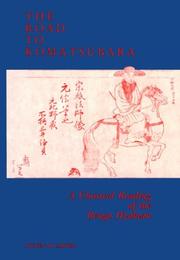| Listing 1 - 10 of 21 | << page >> |
Sort by
|
Book
ISBN: 409657032X 9784096570326 Year: 1993 Publisher: Tōkyō : Shōgakukan,
Abstract | Keywords | Export | Availability | Bookmark
 Loading...
Loading...Choose an application
- Reference Manager
- EndNote
- RefWorks (Direct export to RefWorks)
Book
ISBN: 9780231156479 9780231156486 9780231527064 Year: 2011 Publisher: New York Columbia University Press
Abstract | Keywords | Export | Availability | Bookmark
 Loading...
Loading...Choose an application
- Reference Manager
- EndNote
- RefWorks (Direct export to RefWorks)
While the rise of the charmingly simple, brilliantly evocative haiku is often associated with the seventeenth-century Japanese poet Matsuo Basho, the form had already flourished for more than four hundred years before Basho even began to write. These early poems, known as hokku, are identical to haiku in syllable count and structure but function differently as a genre. Whereas each haiku is its own constellation of image and meaning, a hokku opens a series of linked, collaborative stanzas in a sequence called renga.
Haiku --- Japanese poetry --- Renga
Book
Abstract | Keywords | Export | Availability | Bookmark
 Loading...
Loading...Choose an application
- Reference Manager
- EndNote
- RefWorks (Direct export to RefWorks)
J5720 --- Japan: Literature -- poetry -- renga, renku, hokku --- Japanese poetry --- Renga --- Linked verse --- Renka --- Haiku --- Senryu --- Waka
Book
ISBN: 2913217095 Year: 2004 Publisher: Paris College de France. Institut des hautes études japonaises.
Abstract | Keywords | Export | Availability | Bookmark
 Loading...
Loading...Choose an application
- Reference Manager
- EndNote
- RefWorks (Direct export to RefWorks)
Japanese poetry --- Renga --- Translations into French --- History and criticism
Book
Abstract | Keywords | Export | Availability | Bookmark
 Loading...
Loading...Choose an application
- Reference Manager
- EndNote
- RefWorks (Direct export to RefWorks)
Renga --- Terminology. --- J5506 --- J5720 --- Linked verse --- Renka --- Haiku --- Senryu --- Waka --- Terminology --- Japan: Literature -- reference works --- Japan: Literature -- poetry -- renga, renku, hokku
Periodical
Abstract | Keywords | Export | Availability | Bookmark
 Loading...
Loading...Choose an application
- Reference Manager
- EndNote
- RefWorks (Direct export to RefWorks)
Poetry --- Renga --- Linked verse --- Renka --- Haiku --- Senryu --- Waka --- Mammalogy --- Mammalology --- Mammology --- Mastology --- Theriology --- Zoology --- Mammalogy.
Book
Abstract | Keywords | Export | Availability | Bookmark
 Loading...
Loading...Choose an application
- Reference Manager
- EndNote
- RefWorks (Direct export to RefWorks)
J5730 --- Japan: Literature -- poetry -- haiku, haikai --- Haikai --- Japanese poetry --- Haiku --- Japanese literature --- Renga
Book
Abstract | Keywords | Export | Availability | Bookmark
 Loading...
Loading...Choose an application
- Reference Manager
- EndNote
- RefWorks (Direct export to RefWorks)
J5730 --- Japan: Literature -- poetry -- haiku, haikai --- Haikai --- Japanese poetry --- Haiku --- Japanese literature --- Renga

ISBN: 0912966610 Year: 1983 Publisher: Berkeley University of California. Institute of East Asian studies
Abstract | Keywords | Export | Availability | Bookmark
 Loading...
Loading...Choose an application
- Reference Manager
- EndNote
- RefWorks (Direct export to RefWorks)
Japanese poetry --- Renga --- History and criticism --- Shōhaku, --- Sōcho, --- Sōgi, --- Criticism and interpretation.

ISBN: 0674773853 Year: 1987 Publisher: Cambridge Harvard university. Council on East Asian studies
Abstract | Keywords | Export | Availability | Bookmark
 Loading...
Loading...Choose an application
- Reference Manager
- EndNote
- RefWorks (Direct export to RefWorks)
Japanese poetry --- Renga --- History and criticism --- Theory, etc --- Shōhaku, --- Sōgi, --- Criticism and interpretation.
| Listing 1 - 10 of 21 | << page >> |
Sort by
|

 Search
Search Feedback
Feedback About UniCat
About UniCat  Help
Help News
News